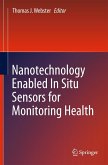Nanopores are nanometer scale holes formed naturally by proteins or cells, and can be used for a variety of applications, including sequencing DNA and detecting anthrax. They can be integrated into artificially constructed encapsulated cells of silicon wafers while allowing small molecules like oxygen, glucose and insulin to pass, while keeping out large system molecules. "Nanopores: Sensing and Fundamental Biological Interactions" examines the emerging research directions surrounding nanopores such as genome sequencing and early disease detection using biomarker identification. Covering the applications of nanopores in genetics, proteomics, drug discovery, early disease detection and detection of emerging environmental threats, it is a must-have book for biomedicalengineers and research scientists
Bitte wählen Sie Ihr Anliegen aus.
Rechnungen
Retourenschein anfordern
Bestellstatus
Storno








